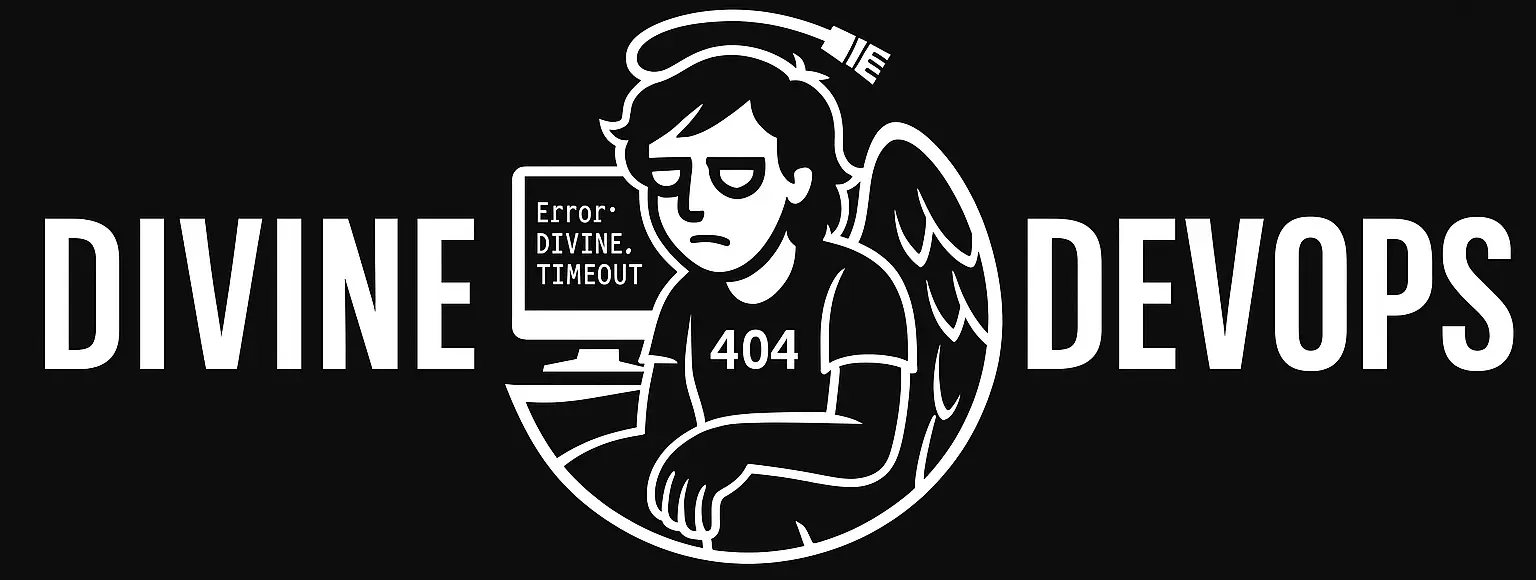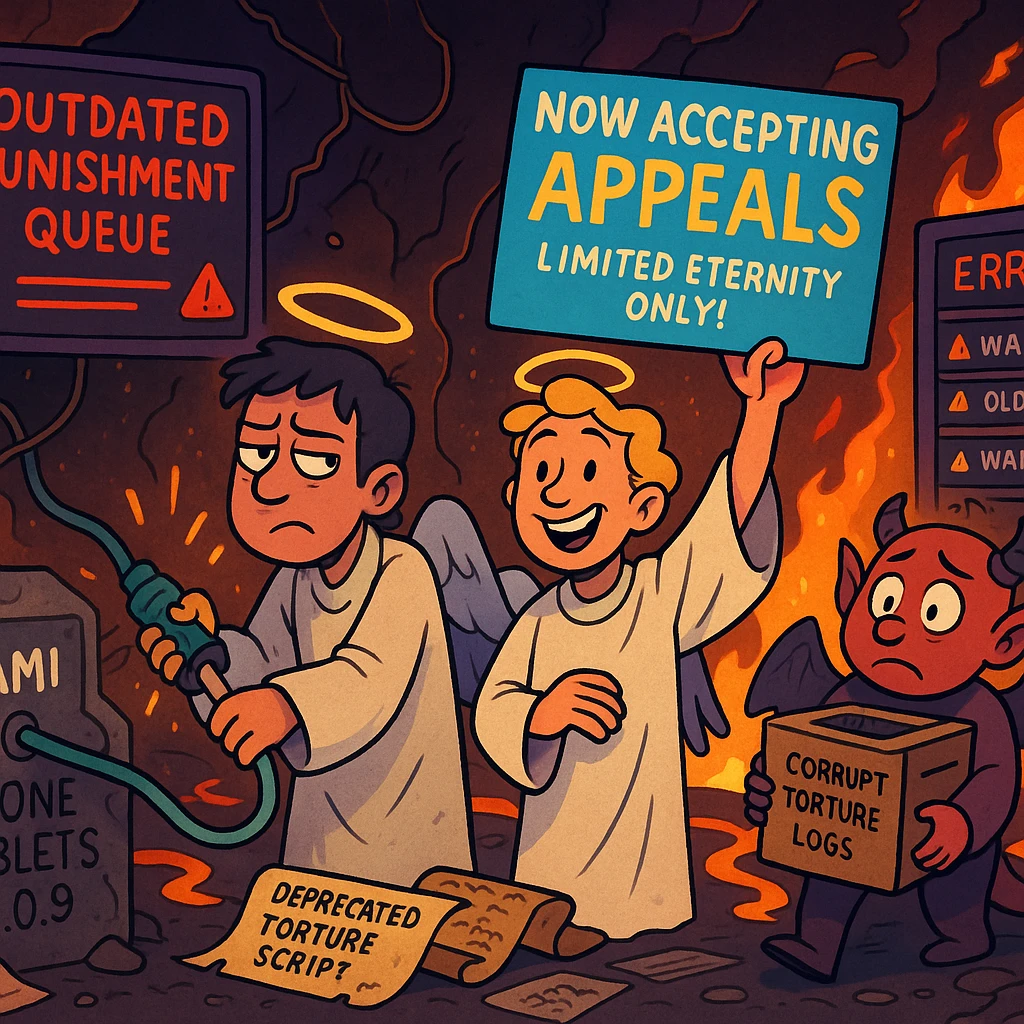RFC: Tartarus System Integration and Migration
Request for Celestial Comments (RFC #2025-TARTARUS)
Abstract
Tartarus has long served as a legacy containment system for extreme cosmic offenders, operating under archaic torment protocols with limited auditability and non-standard punishment escalation rules. As part of HeavenOps’ Unified Afterlife Management Initiative (UAMI), this RFC proposes the gradual integration and phased migration of Tartarus into the structured Celestial Punishment Framework.
Problem Statement
- Tartarus operates on a pre-Olympian rule set, with unreviewed damnation assignments dating back to primordial chaos.
- No formal appeals system exists for misrouted souls, leading to eternal torment without validation.
- Unauthorized punishment escalations have been detected, likely due to rogue Olympian overrides and ungoverned cosmic loopholes.
- Legacy torment subroutines require modernization for ethical compliance under HeavenOps’ latest divine justice principles.
Migration Plan
Phase 1: Audit & Classification
- Conduct a full soul assessment to determine proper classification:
- Hell (Standard Eternal Damnation)
- Purgatory Processing Queue
- Limbo Review Board
- Reinstatement & Parole Considerations
- Establish appeals infrastructure, enabling contested punishments to undergo divine review.
Phase 2: API Integration & Governance
- Develop Tartarus API Gateway to allow controlled querying of legacy torment logs.
- Implement Celestial Wrath Orchestration Layers (CWOL) to regulate punishment routing and compliance enforcement.
- Deploy Miracle-Failover Mechanisms, ensuring ethical sentencing overrides are processed efficiently.
Phase 3: Data & Soul Transfer
- Extract punishment metadata from Tartarus’ Stone Tablets v0.9 database.
- Normalize torment execution methods to align with current afterlife sentencing protocols.
- Migrate valid soul records into Unified Afterlife Management System (UAMS) for structured oversight.
Phase 4: Final Deprecation & Review
- Phase out Tartarus infrastructure and redirect critical containment protocols to Hell Operations.
- Conduct periodic divine justice audits, ensuring ethical compliance and minimizing cosmic backlogs.
- Evaluate potential use cases for repurposed Tartarus architecture (e.g., celestial quarantine zones, decommissioned Olympus relic storage).
Risk Assessment & Mitigation Strategies
Description: Tartarus’ archaic punishment logs may contain corrupt or malformed entries, leading to invalid sentencing assignments.
Mitigation: Implement Divine Data Sanitization Pipelines to filter out inconsistencies and restore proper record formatting.
Description: Rogue entities (Olympian loopholes, unauthorized divine overrides) may attempt to manipulate sentencing rules during migration.
Mitigation: Deploy Immutable Celestial Governance Layers to enforce structured punishment updates and prevent external tampering.
Description: The introduction of formal appeals for Tartarus residents may generate overwhelming case volume.
Mitigation: Establish Expedited Clemency Processing (ECP) queues with priority review protocols to ensure efficient case resolution.
Description: Some legacy torment methods may violate modern celestial ethical standards, requiring reevaluation.
Mitigation: Conduct comprehensive punishment audits to phase out outdated torment mechanics and ensure compliance with Divine Justice 2.0 Framework.
Description: The integration of Tartarus APIs into HeavenOps may result in processing delays due to cross-system inconsistencies.
Mitigation: Introduce Celestial Load Balancing Layers and Torment Execution Optimization to maintain system responsiveness.
Description: Certain entities may attempt to exploit loopholes in parole review criteria, leading to unauthorized celestial reentry attempts.
Mitigation: Enhance Metatron’s Oversight Compliance Suite with real-time parole verification protocols.
Escalation Pathways & Appeals Process
- Souls flagged for misrouted torment undergo case-by-case evaluations before reassignment.
- HeavenOps establishes an Expedited Clemency Pipeline (ECP) to process legacy error corrections.
- Divinity Council oversees final approval, ensuring all escalations adhere to structured sentencing guidelines.
Conclusion
By integrating Tartarus into the HeavenOps framework, this migration will:
- Improve punishment auditability and ethical oversight.
- Enable structured torment escalation, reducing legacy sentencing errors.
- Establish a formal appeals process, ensuring all eternity-bound souls undergo due process.
Next Steps
- Open discussion period for celestial stakeholders.
- Compliance testing with mock data sets.
- Implementation timeline approval by the Divine Governance Board.

